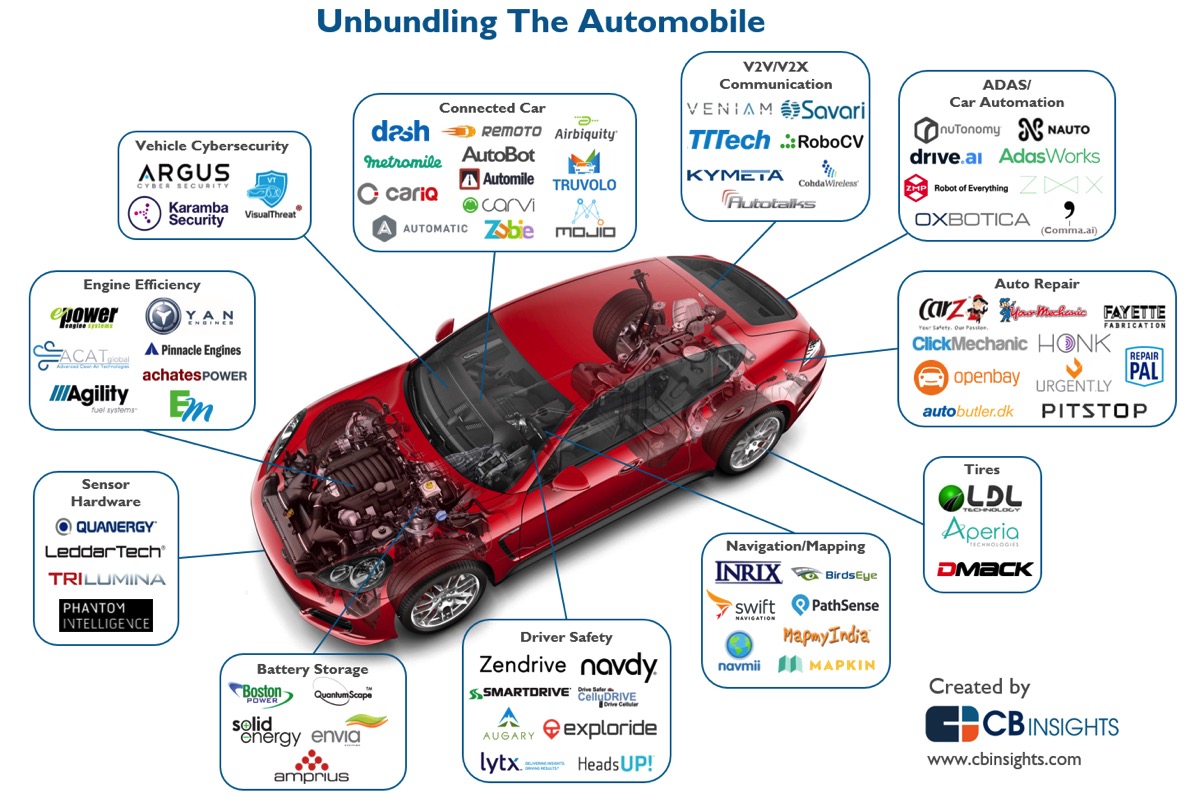The auto industry has seen a flurry of startups and private investment enter the market in the past five years, as cars become more connected, electric, and autonomous.
Startups range from one man units to large teams, with some valuations exceeding $1 billion. But who are the startups? In a CB Insights report (infographic below), the venture capital database firm attempts to “unbundle” the automobile and show what these startups are working on.
Automation takes up the lion’s share of TV and news coverage, but as you can see in the infographic, there is plenty of other parts of the automobile that are seeing startup interest.
While most of the startups have received less than $50 million in funding, it doesn’t mean that they aren’t valuable. Cruise Automation, which sold to General Motors for $1 billion, only raised $15 million and its valuation pre-acquisition was $90 million.
Plenty of the startups are essentially trying to zone in on the auto issue, instead of building services that rival Android or Google Maps.
Take PathSense, a 10-person navigation startup based in Palo Alto, California. The team has released four SDKs, three for Android, one for iOS, which attempt to improve accuracy, speed, and lower battery drain when using GPS or geolocation tools on mobile.
PathSense, in a way, appears to be marketing itself to Google or Apple. It has tech and talent, two things the giants are in need of, especially for their own autonomous projects.
Auto aftermarket also an opportunity
But while everyone may be waiting for a fully autonomous car, the huge existing auto fleet presents an opportunity as well. Aftermarket autonomous features will be big as well.
“I think the broader perspective is that American’s can’t afford new cars and the automotive industry itself relies on the upsell of new features as an enticement for people to buy,” says Andy Karuza, CEO of Fensens, a wireless parking sensor and app. “Now, the new features are becoming more accessible and affordable through technology, allowing consumers to bypass having to get the new car all together. This will likely be a larger trend with IoT technology. ”
See Also: Tesla’s self-driving AI will “blow minds,” says Musk
We have written a few articles on nuTonomy, a MIT spinoff that entered Singapore earlier this year. The startup, which is building an autonomous shuttle system, recently received approval from Singapore’s Land Transport Authority (LTA) to expand its autonomous trial in more zones.
nuTonomy’s goal is to provide its shuttle service to the entire city state of Singapore, possibly entering into other markets during that time. People will be able, in the future, to call for the shuttle in the same way we book Uber’s today—minus the driver.
As startups dive into these different sectors, it is possible they will find new methods that improve platforms and products outside of the automobile. Cybersecurity firms may create encryption that surpasses current end-to-end encryption on mobile messaging services, mapping and navigation firms have already proved their worth, as shown by the upgrades PathSense has made to Android and iOS navigation in its short lifespan.



















